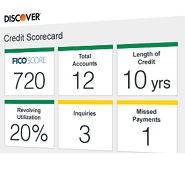Reposting this as we’re coming into July 1st. It seems like that will actually start removing these from their databases starting July 10th. More information here.
The WSJ is reporting that starting around July 1st the three major nationwide consumer reporting agencies (commonly referred to as credit bureaus) will remove tax-lien and civil-judgement data. These negative items will be removed if the items don’t include a complete list of at least three data points: a person’s name, address and either a social security number or date of birth.
The company behind the FICO score is estimating that this will affect roughly 12 million U.S. consumers (~6% of total population) and that just under 11 million people will see a score improvement of less than 20 points. Critics of the change are saying that this will give people that are more likely to default better access to credit.
My personal opinion is that inaccurate negative items that appear on a consumers credit report also greatly affect a consumers access to credit and it’s not unreasonable to ask that these negative items contain those three basic data points mentioned above.
Let me know your thoughts on this change in the comments below.







this is fine, but i am MOST concerned about all the other black ops secret data collecting agencies that nobody talks about or even knows about. everyone is too focused on the common big 3 players. there are hundreds more that are just as critical. LexisNexis is a major one. there are tons of companies that collect your shit and you dont know until it hurts you due to inaccurate crap.
These positive changes have been the most reported set of changes that go into effect on July 1st (perhaps because they affect the most people). However, I also have read that people with large amounts of available credit will see their scores go down, as this is now being seen as a potential liability to issuers. Any more word on these changes and how drastically scores may be affected? I think that these will likely affect most of us who read your site and are pretty invested in the miles and points game.
If it’s true that your score will go down if you have a large amount of credit, then couldn’t you just lower the credit limit on your cards to counteract this? I have several cards with over $30K in CL.
Certainly there are a number of strategies one could take to maximize your score (e.g. lowering credit limits, closing sock-drawered cards). However, I haven’t seen anything concrete about how drastic these changes might be and whether or not, say, the benefits of lowering your credit limits or closing accounts outweigh, say, lowering your AAoA or your utilization.
William’s post had concrete information about the effects of the positive changes — “That just under 11 million people will see a score improvement of less than 20 points” — and I was hoping we might see something along these lines for the others.
I don’t think it will make much of a difference. I suspect for a large majority of people with outstanding civil judgments there are many other negative tradelines in their reports.
The way civil judgements are recorded in your credit report are so inaccurate its not even funny. Friend of mine got burned with an inaccurate civil judgement showing up on his credit report. If someone with a similar name as you are so much named in a lawsuit, even if the suit is dropped, it usually shows up as a judgement against you in your credit report.
Plaintiffs and their lawyers also don’t ever file with the court when a judgement is paid, like they are legally required to.
I could go either way—if the information contains the SSN (and we assume the SSN is correct), then the other pieces of information are redundant and it should appear on their report.
On the other hand, if you don’t have a person’s name, address, and DOB – how do you know it’s unique and actually correct?
It’s my opinion that negative information on a credit report needs to be 100% right all the time, and – if you can’t guarantee that – it’s better to let a few “guilty” people walk in favor of not tarnishing the credit reports of “innocent” people.
This is my thought, negative information can have such an impact and a lot of people don’t know to check your report for inaccuracies. The other issue is that even when you do spot an inaccuracy getting it removed can be time consuming.